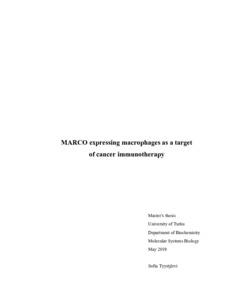MARCO expressing macrophages as a target of cancer immunotherapy
Tyystjärvi, Sofia (2019-05-10)
MARCO expressing macrophages as a target of cancer immunotherapy
Tyystjärvi, Sofia
(10.05.2019)
Julkaisu on tekijänoikeussäännösten alainen. Teosta voi lukea ja tulostaa henkilökohtaista käyttöä varten. Käyttö kaupallisiin tarkoituksiin on kielletty.
suljettu
Julkaisun pysyvä osoite on:
https://urn.fi/URN:NBN:fi-fe2019052016195
https://urn.fi/URN:NBN:fi-fe2019052016195
Tiivistelmä
Macrophage receptor with collagenous structure (MARCO) was previously found to be expressed on a subpopulation of pro-tumorigenic M2-type macrophages in different mouse and human tumors. Furthermore, targeting these MARCO+ macrophages with anti-MARCO antibody was shown to reduce tumor size and metastasis as well as to polarize pro-tumorigenic M2-type macrophages into anti-tumorigenic M1-type. It is likely that these anti-cancer effects are not solely dependent on macrophage polarization and require contribution from additional cells or factors.
The first aim of this study was to investigate the contribution of T cells in anti-MARCO treatment by comparing tumor sizes between mice that were given T cell depleting or control antibody and then anti-MARCO treatment. The second aim was to study how anti-MARCO treatment affects angiogenesis by analyzing two- and three-dimensional tumor blood vessel stainings. The third aim was to examine, if anti-MARCO antibody stimulation in vitro can polarize peritoneal macrophages towards M1-type by analyzing the secretion of two pro-inflammatory cytokines and a set of 38 metabolites.
This study indicates that anti-MARCO treatment is not dependent on T cells, as the treatment was able to reduce tumor size even in T cell depleted mice. The effect of anti-MARCO treatment on angiogenesis is still unclear, but MARCO+ macrophages in the tumor microenvironment were found to be perivascular, which suggests that they might induce blood vessel formation. Anti-MARCO stimulation in vitro did not trigger peritoneal macrophages to secrete the studied cytokines nor induced major changes in the metabolome. The results indicate that more research is needed to understand the mechanism of anti-MARCO treatment and the signaling pathways of MARCO.
The first aim of this study was to investigate the contribution of T cells in anti-MARCO treatment by comparing tumor sizes between mice that were given T cell depleting or control antibody and then anti-MARCO treatment. The second aim was to study how anti-MARCO treatment affects angiogenesis by analyzing two- and three-dimensional tumor blood vessel stainings. The third aim was to examine, if anti-MARCO antibody stimulation in vitro can polarize peritoneal macrophages towards M1-type by analyzing the secretion of two pro-inflammatory cytokines and a set of 38 metabolites.
This study indicates that anti-MARCO treatment is not dependent on T cells, as the treatment was able to reduce tumor size even in T cell depleted mice. The effect of anti-MARCO treatment on angiogenesis is still unclear, but MARCO+ macrophages in the tumor microenvironment were found to be perivascular, which suggests that they might induce blood vessel formation. Anti-MARCO stimulation in vitro did not trigger peritoneal macrophages to secrete the studied cytokines nor induced major changes in the metabolome. The results indicate that more research is needed to understand the mechanism of anti-MARCO treatment and the signaling pathways of MARCO.
